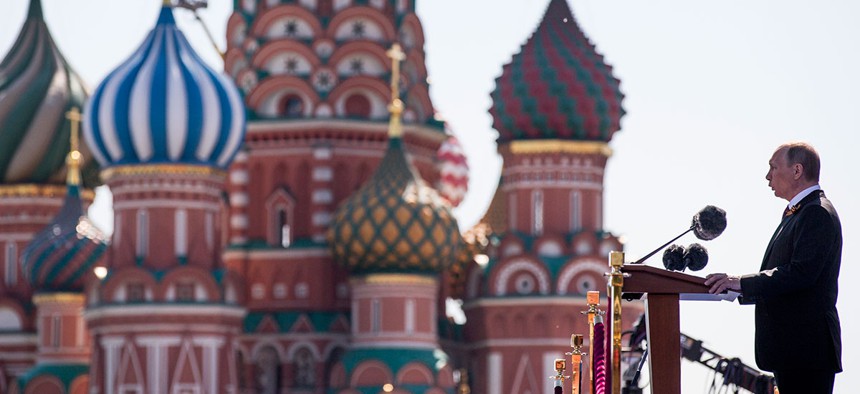Why Russia Ordered the U.S. to Reduce Its Diplomatic Staff
The step comes a day after the U.S. Senate passed a sweeping sanctions bill, which now awaits President Trump’s signature.
Russia ordered the U.S. Friday to reduce its diplomatic staff in the country to 455 and seized two American diplomatic properties, in retaliation for similar steps ordered by the Obama administration last December and a sweeping sanctions bill approved this week by the U.S. Congress.
“The Russian side is suspending as of August 1 the use by the U.S. embassy in Russia of all warehouses on the Dorozhnaya Street in Moscow and the dacha compound in Serebryanyy Bor,” the Russian Foreign Ministry said in a statement.
The action also requires the U.S. to reduces its diplomatic staff to 455 by September 1—the same number of diplomats Russia maintains in the U.S.
The Russian move comes a day after the U.S. Senate passed 98-2 a sweeping sanctions bill that would tighten restrictions on a range of Russian businesses and interests, setting up a clash with President Trump, who must now decide whether to sign or veto it. The U.S. House of Representatives passed a similar measure earlier this week also by a wide margin, 419-3. As it stands now, Congress has more than enough votes to override a presidential veto.
The measure, which also tightens sanctions against North Korea and Iran, is especially controversial because not only does it tighten sanctions against Russia for its election interference and invasion of Crimea, but it mandates that the president consult with it before waiving the punitive measures against Russia; at present the president can waive sanctions determined to be detrimental to U.S. interests.
But as I wrote this week, when the House passed the measure:
The approval of the House measure comes amid scrutiny of the Trump campaign’s ties to Russian officials in the run up to the 2016 presidential election. U.S. intelligence agencies say Russia interfered in the election in order to boost Trump, though it’s unclear if Moscow’s efforts succeeded. Trump’s equivocation over the issue has led to more speculation about his campaign’s ties to Russian officials—links that are being investigated by the Justice Department and congressional committees.
The Russian actions are the first direct retaliatory steps for Obama’s action in December 2016 of expelling 30 Russian diplomats from the U.S. and seizing Russian diplomatic compounds in New York and Maryland in retaliation for Moscow’s interference in the U.S. presidential election. Russia had waited for Trump’s inauguration to see if he would carry out his professed goal of improving relations with Moscow. Trump has not said whether he’ll sign the measure, but he has in the past indicated that he views Russia as an important partner in the fight against terrorism, especially ISIS.
But the vote also sets up a clash between the U.S. and the European Union because the measure would also target European business interests in Russia, especially in the energy sector. Russia is the largest supplier of energy to the bloc. The European Commission, the EU’s executive, criticized the House version of the measure, saying it “could have unintended unilateral effects that impact the EU’s energy security interests.” Jean-Claude Juncker, the European Commission president, warned that if the U.S. didn’t take European concerns into account sufficiently, “we stand ready to act appropriately within a matter of days.” The Financial Times reported this week that the EU was already drafting possible countermeasures against the U.S., including and up to “WTO-compliant retaliatory measures.”
European reaction to the House vote can be best understood through the prism of the joint U.S.-EU sanctions imposed on Russia in 2014, following its invasion of Ukraine’s Crimea. Those sanctions took European interests into account. But the new measure would, besides targeting Russia’s mining, shipping, defense, and other sectors, also impose penalties on joint European-Russian energy projects; the Nord Stream 2 pipeline from Russia to Germany is seen as particularly vulnerable—though that project has itself prompted divisions within the EU, with both Poland and the Baltic states, which have a long memory of Russian influence in their countries, arguing it makes Europe too reliant on Russia.
Any retaliatory EU action against the U.S. is likely to have a detrimental effect on the joint face the two allies have maintained until now against Russia’s actions in Ukraine. If the Congress-approved measure becomes law, and Europe responds, Russian officials will likely see the action as the first of many potential cracks in the Western alliance against Moscow.



